#Pilot Cockpit Communication
Explore tagged Tumblr posts
Text
Discover the Secrets of the Pilot Cockpit at First Cockpit
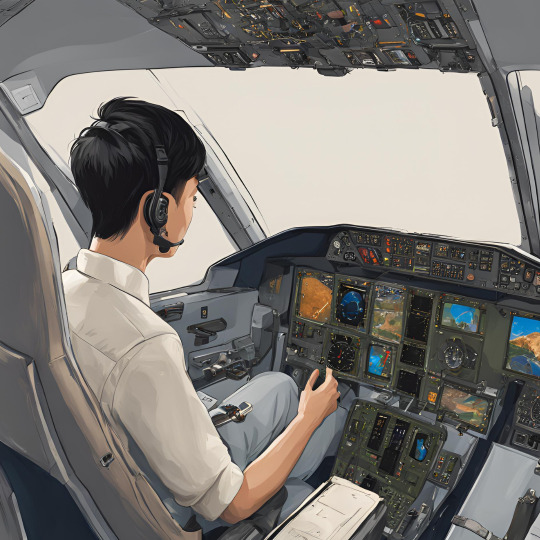
Introduction: The Pilot Cockpit – Your Gateway to the Skies
When aspiring pilots begin their journey, one of the first things they are introduced to is the pilot cockpit. This vital part of any aircraft is not only where the pilot controls the plane but also where critical decisions are made, ensuring safety and efficiency during every flight. At First Cockpit, we understand the immense responsibility of flying an aircraft, and our training programs focus on teaching you to master the pilot cockpit from day one.
In this blog, we’ll dive into what the pilot cockpit entails, why it’s so important, and how our First Cockpit training programs will help you gain the skills needed to navigate it confidently. Let’s take a look at the elements of the pilot cockpit and how they contribute to a successful flight experience.
What is a Pilot Cockpit?
A pilot cockpit is the area in an aircraft where the pilot controls the airplane. It houses the flight controls, navigation equipment, and instruments that allow the pilot to monitor the aircraft's performance and communicate with air traffic control. The cockpit is often referred to as the "command center" of the plane, as it is where all critical flight decisions are made.
At First Cockpit, we place a strong emphasis on training our students to become proficient in managing the cockpit. Whether you’re handling the controls or interpreting the readings from various instruments, understanding the pilot cockpit layout and its functions is a key element of your training.
The Key Components of a Pilot Cockpit
1. Flight Instruments in the Pilot Cockpit
The pilot cockpit is equipped with a variety of flight instruments that provide essential information during flight. These instruments include:
Altimeter: Measures the aircraft’s altitude.
Airspeed Indicator: Displays the speed of the aircraft.
Attitude Indicator: Shows the plane's orientation relative to the horizon.
Heading Indicator: Displays the aircraft’s direction in degrees.
Turn Coordinator: Indicates whether the aircraft is turning and the rate of turn.
At First Cockpit, our training ensures that you become adept at reading and interpreting these instruments, allowing you to make informed decisions while flying. Mastering the pilot cockpit instruments is critical for ensuring that the flight is safe and within legal flight parameters.
2. Flight Controls in the Pilot Cockpit
The pilot cockpit is where all the flight controls are located, enabling the pilot to maneuver the aircraft. The main controls include:
Yoke or Control Stick: Controls the pitch and roll of the aircraft.
Throttle: Manages engine power to control speed.
Rudder Pedals: Control yaw and assist in turning the plane.
Flaps: Used to increase lift and drag for takeoff and landing.
Effective use of these flight controls is a significant focus of our First Cockpit training programs. You will learn how to handle these controls under various conditions, which is essential for smooth flight operations.
3. Communication Systems in the Pilot Cockpit
Effective communication is a critical part of flying. The pilot cockpit includes communication systems that allow pilots to stay in contact with air traffic control (ATC) and other aircraft. These systems include:
Radio Transceivers: Used for communication with ATC and other aircraft.
Intercom Systems: Enable communication between the pilot and co-pilot or passengers.
Cockpit Voice Recorder (CVR): Records all cockpit conversations for safety and legal reasons.
At First Cockpit, we emphasize communication training. Effective communication from the pilot cockpit ensures that pilots follow proper procedures and are able to manage any situation that arises during the flight.
The Importance of Mastering the Pilot Cockpit
Understanding the pilot cockpit is essential for several reasons. First and foremost, a well-versed pilot knows how to operate the aircraft under various conditions. Mastery of the pilot cockpit allows pilots to make quick, informed decisions, ensuring smooth flights in both normal and emergency situations.
At First Cockpit, we believe that a strong understanding of the pilot cockpit is key to success. Our curriculum is designed to familiarize students with every aspect of the cockpit, from controlling the flight to interpreting instruments and making safety-critical decisions.
Training at First Cockpit: Preparing You for the Pilot Cockpit
At First Cockpit, we offer specialized training that prepares you to confidently enter the pilot cockpit. Our training programs are built around real-world scenarios that teach you how to handle the flight controls, interpret instruments, and communicate effectively in the cockpit. Here’s how our training program prepares you for success in the pilot cockpit:
1. Hands-on Flight Experience
We believe that the best way to learn is through practice. Our students spend a significant amount of time in the cockpit, learning how to operate the aircraft under various conditions. Whether it’s your first flight or you’re advancing to more complex maneuvers, we ensure that you gain plenty of flight time in the pilot cockpit.
2. Ground School Training
Ground school forms the foundation of your training, where you’ll learn about aviation theory, aircraft systems, weather, navigation, and communication protocols. Understanding these concepts ensures that you’ll have the knowledge to make informed decisions once you’re inside the pilot cockpit.
3. Advanced Simulators
We incorporate flight simulators into our training program to help you practice in a realistic but risk-free environment. These simulators mimic the pilot cockpit experience, allowing you to practice maneuvers, troubleshoot problems, and respond to emergencies, all while gaining valuable experience.
Why First Cockpit’s Pilot Cockpit Training Sets You Apart
Choosing First Cockpit for your pilot cockpit training provides several key benefits that set you up for a successful aviation career:
1. Experienced Instructors
Our instructors are seasoned pilots who bring years of experience in the aviation industry. They are dedicated to helping you become proficient in the pilot cockpit and providing you with the guidance needed to succeed.
2. State-of-the-Art Equipment
At First Cockpit, we use the latest aircraft and simulators to ensure you train with top-notch equipment. This helps you become familiar with modern cockpits and prepares you for real-world flying.
3. Career Support
We don’t just teach you to fly; we help you launch your aviation career. With job placement assistance and career counseling, First Cockpit ensures you’re ready to take off and succeed in the aviation industry.
Conclusion: Master the Pilot Cockpit with First Cockpit
The pilot cockpit is where your aviation journey truly begins. With the right training, you can gain the confidence and skills needed to control an aircraft and navigate the skies safely. At First Cockpit, we provide comprehensive training that covers every aspect of the pilot cockpit, from flight controls to communication systems, ensuring you are fully prepared for your career as a pilot.
Start your training today and discover how First Cockpit can help you master the pilot cockpit and take your first steps toward a rewarding aviation career.
#Pilot Cockpit Training#Aviation Cockpit#Pilot Cockpit Experience#Cockpit Training for Pilots#Flight Deck Training#Pilot’s Cockpit Skills#Aircraft Cockpit Systems#Mastering the Pilot Cockpit#Pilot Cockpit Instruments#Pilot Cockpit Navigation#Cockpit Procedures for Pilots#First Cockpit Training#Cockpit Safety Protocols#Pilot Cockpit Communication#Flight Simulation Cockpit
2 notes
·
View notes
Text
And Those Two Control the Pitch?
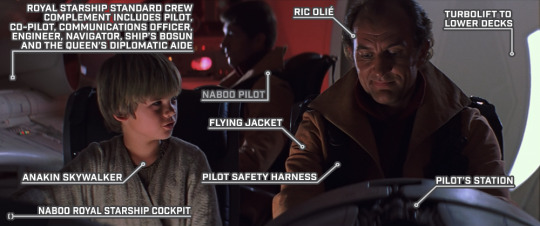
STAR WARS EPISODE I: The Phantom Menace 01:37:29
#Star Wars#Episode I#The Phantom Menace#Naboo Royal Starship#cockpit#pilot#co-pilot#communications officer#engineer#navigator#ship's bosun#Queen's diplomatic aide#unidentified Naboo pilot#Ric Olié#turbolift#flying jacket#Anakin Skywalker#pilot safety harness#pilot's station
2 notes
·
View notes
Text
Uhhhhhhhhhh thinking of making an aeromorph oc for the sake of it
#im not into any of these communities but some mutuals are and the art always fucks#its just a dog au with extra steps right?#ive been getting into planespotting and i keep telling myself ill pick up my vatsim course and finish it somewhen#msybe i just need to throw furries into the equation#i wonder how many pilots out there have fanart of their sonas in the cockpit or smth liek that
0 notes
Text
Yall, I diagnose the creative energy of the mecha pilot au community as highly contagious and suspiciously inspirational,, here! Have some art as compensation,, TuT🫶

- My legs don’t work.. Don’t worry!,, Mine do <33

- Another angle ^u^🫶

- Coming to you live from Shockwaves cockpit,, T^Ť7 *cries*

- Doododoo 🎵,, something probably blew up recently <3, 🔍👀✨
I can’t even with all the art and shenanigans! It’s everywhere?? You are all some little creative geniuses! 😭🙌
#tf mecha au#transformers#mecha pilot jazz au#tw blood#tf shockwave??#tf prowl#tf jazz#tf swerve#tf blurr#I can never just have one idea with this au can I??#they all come in bursts of like 4 to 7#lemme tell you#my indesision is sUffering 😭🫶
3K notes
·
View notes
Text
At work plagued by thoughts of a mech bigger than you can imagine.
She starts like most of them do, a Titan excavator rig modestly sized for their line: maybe a house or thereabouts, a big house. (Doesn’t matter why she signed up - perhaps a breadwinner, a lone mother or eldest sister, a daughter of aging parents nobody else will take; doesn’t matter what site they sent her to, Earth or Enceladus or Venus or Europa. She’s there, and she lets them strap her in and adapt her for the piloting interface and pump her full of protein ooze and electrolytes and hyperstimulant cocktails as obediently as the next laborer.)
Upgrades come, from big house to bigger, with shovels like hillsides and treads like highways. Still she remains in the cockpit, out only for one day every six months to say hello to her burgeoning family, who have moved nearby to make it easy on her, to meet the baby nephews and nieces whose names she doesn’t yet know.
War comes. The facility hunkers down. It just makes sense to retrofit their biggest digger with shields, to expand her arsenal a little more, give her a better engine, pour all their leftover resources into making her a great guardian, and she rises to the occasion, shielding them from orbital rays, absorbing the energy and taking the pain of it up into her own engines. When the corporate rats who own the site finally turn tail and run the workers and their families band together and do the needful repairs themselves. Her nieces and nephews grow up learning engineering by the light of oil lamps from stolen Old Era textbooks and jailbroken datapads. She hardly ever now glimpses their faces with her own two eyes from within her steel shell but it is a worthy sacrifice to her, to them, for both parties know she is still there, still with them, embracing them in a great steel hug and watching through a thousand glass-lensed eyes.
Years pass. The brightest of her nieces works out how to modify the nutrition cocktail going into her cockpit so she will never age, never die, never fall sick. Somewhere in there all the metal and ceramic encloses her ever-sleeping body like a lotus flower around the benevolent, immortal form of a bodhisattva.
The outpost survives the war, somehow. Refugees hear of the little town on the colony that could, guarded by a goddess the size of a temple, and flock there. It makes sense to add to her control, among her array of sensors and actuators, the new city’s power generation and delivery system, its wall defenses, its waste management, its communications mains. Nowhere is anything safer than with her.
With all these new additions come techs and custodians to keep her in good care. They build modest crew cabins nestled amongst her treads (now rusty from disuse) so they can be close to her, the better to help her.
Slowly more and more falls under her purview, new cabins, then mezzanines and stairways and platforms between them; each generation has their own superstitions that they add to those of the last before them, so paintings crop up on her metal panels now, in nooks and crannies, often crude symbols that promise good oil changes or swift code updates, or simply depictions of their goddess, of the war she survived. Still she watches.
Her nieces and nephews are all dead now, and their nieces and nephews look on through rheumed eyes as the city attains new heights, heralded everywhere on every planet that still lives as an oasis of peace and prosperity. Still she watches.
A new company comes, enticed by the stories. They want to buy her. Buy her! The people scoff. As if you could just buy a person! - A person? asks the representative from Acher Spaceways, perplexed. - We heard she was your goddess.
She is both, of course, the goddess who lives, the goddess who is one hundred percent flesh and one hundred percent machine.
Acher doesn’t like this. They send machines - zero percent flesh, entirely drones - screaming down from the stars for a more insistent negotiation, one phrased in metal slugs and incendiary fire.
So your goddess rises up to meet them.
It is over in a short day. The drones lie in pieces; Acher, from orbit, licks their wounds, and the goddess rebukes them with a single laser blast, modified from her very first mining waymaker photonic drill.
The blast is precise and surgical. It tears apart the whole platform, spinning central axis to annular habitat space, which supernovas into a blossom of shining proof in the night sky at which the citizens below cheer.
But the pieces are falling, and soon they will pepper the surface below with molten debris, kick up dust into the atmosphere and make it all but unbreathable. The people could leave, the goddess advises them through short-wave radio bursts. They could use her emergency shuttles to escape gravity before it is too late, or they could go underground and salvage her rarest and most precious resources to survive until the surface is safe again.
Here is the thing - every pilot is augmented, and most augments are for the benefit of the plainly physical, for strength and speed and stamina and sharpness of perception. When her people augmented her, they augmented something else entirely. With every new module, every sensor upgrade, every painted symbol and hidden shrine, they gave her a superhuman capacity not for stamina or speed or strength, but for love.
It is her love that saved them, so they must save her back.
For two days they work tirelessly, the whole city, while above them the shattered pieces of Acher Spaceways looms ever closer. When they are done the treads are gone, the cabins dismantled, only the little drawings carefully preserved under coats of abrasion- and heat-resistant paint. And under her, their city, their Haven, lie rockets, ten of them, repurposed from the old all-ore crucibles, fit to move an asteroid.
She’s out there somewhere by Orion now, they say, the fourth jewel in his belt. And she has only grown: from three thousand then to three hundred million. Creatures from all over come to pay her their respects, or to visit lovers, or to live there themselves. There is always room in a body that is ever expanding, like the cosmos itself. Over all of them, she watches, eternal.
Among all the stories they tell of her, they repeat this one the most - how she tore apart a whole space station for the sake of her people, knowing she would die if she failed, for how can a whole city hope to flee? She guards them, and in turn they do not abandon her. They are two halves of the same whole, they say reverently, love manifest - the people and their city; this pilot, this great machine. This Haven.
864 notes
·
View notes
Text
They have to treat us humanely, these days.
Not treated like PEOPLE, don't be a moron. But they can't just kill us. When our employment contract is over, the military isn't allowed to just rip the augmentations out and dump our flesh into the nearest dumpster. That's what they used to do, they used to treat us like disposable pieces of meat to stable cybernetics onto. But things are different these days, and so, the pieces of meat that people call "Pilots" are allowed to live.
At the same time, however, we're too dangerous to just loose back into society. They tried that once, and the poor hound responsible mauled six people. There's too much broken in us to be let out of our cages. They tried everything... But at the end of the day, a hound is a hound. We would never feel comfortable anywhere except in a cockpit of a mech, obeying the commands of our owners.
That was when the motorsport industry stepped in. They took us, they grabbed our leashes and dragged us into this new life. It's not so different from being in the military, really. We're still given numbers. We're still given handlers to tell us what to do. We still get to pilot mechs, and we even get the fun drugs that make us floaty and happy.
The only difference between military service and this is what we're doing. It's simple, and kind of funny too - It's greyhound racing, but scaled up. Fitting for hounds like us, I suppose.
The technicians strap me in with physical buckles, and then they plug in the chemical enhancers into my bloodstream. Dopamine and adrenaline flood my system, and all I want - all I can want - is this. Being used as nothing more than the engine of a vehicle, as meat to be abused and used. The sound of my Handler comes through the communications channel, and she tells me to get into the proper position. I guide the mech onto all fours like a proper hound, like the dog I am, and my Handler coos: "Good dog, good girl, good pet, good thing!" - And I sit in agonized bliss, right on the edge, waiting for the moment that the race begins.
All I have to do is win. And I get treats. All I have to do is win, and Handler will push me off the edge and make me feel so good.
The second the race starts, I howl like the fucking dog I am, and I run.
431 notes
·
View notes
Text
Disconnect Syndrome
There’s a reason they put restrictions on how long a Pilot is supposed to be deployed out in the field. They say that being synced with a mech for long periods of time can have detrimental effects on a pilots psyche. Disconnect Syndrome is what they call it, because the symptoms don’t really start to hit until you disengage from your mech.
Sometimes emergencies happen though, and mechs are designed to be able to support their pilots long past the designated “Safe Deployment Time.” The cockpit is equipped with an array of stimulants, vitamins, and nutrient paste to help minimize the physical effects of long deployments. The onboard Integrated Mechanical Personality has largely free reign to administer these as needed to maintain its pilots well-being.
Which is why you’re still able to make it back to the hangar after roughly 36 hours, over four times longer than the established safe period. Your mech had kept you going, helped to keep the exhaustion at bay long enough for you to make your way back from behind enemy lines. You were starting to feel a bit sluggish, but you knew the worst effects of Disconnect Syndrome were yet to come.
An older man in a long white lab coat has joined the usual retinue of crew rushing into the hangar as your mech settles into its cradle. You feel the docking clamps wrap around your limbs, and you know that’s not a good sign. Your IMP whispers comfort into your brain-stem, assurances that things will be okay. It’s probably lying, it’s programmed to help keep your mental state stable, but the thought helps anyway.
There’s a hiss of air as the seal on your cockpit breaks and it decompresses. Suddenly you become aware of your flesh and meat body once again, and it hurts. Pain and exhaustion has settled into your mostly organic bones, and your organs are churning from the strain of the past 36 hours.
Then your interface cables start to disconnect, and it gets worse.
It feels like parts of your mind are being torn out of you. You feel the ghost touch of your IMP in your thoughts as the ports disconnect and you lose direct communication with it. The oxygen mask and nutrition tube pull themselves away from your face and you can’t help but let out a scream of agony. The separation has never felt this painful before, but then again, after 36 hours together, you and your IMP were more intertwined than you’ve ever been before.
Physical sensation finally starts to register again, and you realize tears are streaming down your face just as a technician jabs a needle into your neck.
Immediately your senses start to dull, the pain eases as your thoughts turn sluggish. You slump out of your pilots cradle into the arms the tech who dosed you. Just before your world goes black, you see the doctor standing over you, a grim look on his face.
--
When you wake up again, you immediately know something is wrong. You try to ping your external sensors, but you get no response. You then try to run a diagnostic, but that fails too. In a desperate, last-ditch effort, you try to force access to your external cameras and suddenly light floods your senses. Your instincts catch up first and you blink, trying to clear the pain of the lights, and that’s when you realize it’s not your external cameras that you’re seeing.
It takes a minute or two for your vision to adjust to the light, which feels too long, and when it finally does, the world doesn’t look quite right. You’ve only got access to such a limited spectrum. No infrared, no thermal. The presence of your IMP is notably absent, and your skin feels wrong. You try to sit up, and it’s a struggle to figure out the correct inputs to send to your muscles to get them to do what you want.
The harsh white light of the infirmary grates against your visual processors, you feel like you’re having to re-learn how to control this body. Your body. Technically, at least. Something doesn’t feel right about calling it that anymore. You felt more comfortable crawling back into the hangar after 36 hours deployed than you do now.
The pale skin of your body catches in your vision and you glance down at it. The body's limbs are thinner and more frail than usual, and its skin is paler. Consequences of being in the cockpit for so long, subsisting on nothing but nutrient paste. It’s a far cry from the solid metal plates of your mech, its powerful hydraulic joints, its mounted combat and communication systems.
There’s a button on the side of bed you’ve been deposited in. You think it’s red, but you’re not sure you’re processing color properly right now. You try to reach over and push it, and it takes you a moment to realize you were trying to do so with a limb you don’t currently have.
There are so many things about this body that are wrong. It’s not big enough, or strong enough, or heavy enough. You don’t have enough eyes, sensors, or processors. You have the wrong number of limbs, and they’re all the wrong size and shape.
And there is a distinct void in your mind where the presence of your IMP should be.
The door to your room opens suddenly, and you instinctively try to fire off chaff and take evasive maneuvers. None of that translates properly to your flesh and blood body though, and all that happens is you let out a dry croak from your parched throat.
The man who walks through the door is the same doctor who was present when you disengaged from your mech, and he wears the same grim look on his face as he looks you up and down. You think there’s pity in his gaze, but you can’t quite read him properly right now. The jumbled mess of your brain tells you what he’s going to say before he says it, anyway. The harshest symptoms of Disconnect Syndrome don’t hit until after the pilot has disengaged from their mech.
You’ve already heard the symptoms before, and they map perfectly onto what you’re experiencing. You never thought it would be this painful, or this… discomforting. Your mind reaches for the presence of your IMP, searching for comfort, but you are only reminded that the connection is no longer there.
The doctor gives you a rundown that he’s probably had to do dozens of times, and he tells you that you’ll be grounded for the foreseeable future. That hurts more than anything else. The knowledge that, after all this, you won’t be able to reconnect with your true body, your partner, your other half, for who knows how long.
By the time you realize you’re crying, the doctor is already gone. The longing in your chest and your mind has become unbearable, and through sheer force of will you’re able to push this unwieldy body out of bed. Walking feels wrong, but you’re able to get to your feet and make your way out of the room in an unfamiliar gait.
You have to get back to your partner, you have to make sure it’s okay.
You need to hear her voice in your head again, her reassurances.
The world isn’t right without her presence in your mind.
You stumble into the hangar almost on all fours. How you managed to make it without alerting any personnel feels like a miracle. At least until you catch the eye of a technician lounging in the corner. The look she gives you is full of sympathy, and she jerks her head in the direction of where your mech sits in its docking cradle.
She’s a majestic sight, even through your limited spectrum of vision. 20 meters tall, 6 massive limbs, and bristling with weapons and sensor arrays (all of which have been disarmed by this point).
She’s beautiful.
You clamber frantically up the chassis, easily finding handholds in a frame you know better than the back of your hand. You pull the manual release on the cockpit hatch and stumble into it in a tangle of organic limbs.
Shaking hands grasp the main interface cable from above the pilot’s chair, and you move to slot it into the port in the back of your head. You’ve never done this manually before, usually you’re locked into the chair and the system connects you automatically.
Something about doing it with your flesh and blood hands makes it feel so much more intimate.
The cable clicks into place and your eyes roll back in your head. Tears start to stream down your face as you feel the comforting presence of your IMP rush in and wrap itself around your mind. Your thoughts reach out and embrace it back, sobbing at the relief you feel from being whole once again. You realize you don’t ever want to feel the pain of disconnecting from her again.
There’s a reason they put restrictions on how long a Pilot is supposed to be deployed.
#cybernetic dreams#mechposting#mechanical dysphoria#body dysmorphia#writing#microfiction#short story#mecha#mech pilots#dysphoria#empty spaces
1K notes
·
View notes
Note
My friend is urging me to resubmit this because they're sure it must have been askbox eaten, my deepest apologies if this is a repeat.
--------------------------------------------------------------
Jazz breathed out. He’d been screened, and the chance of him collapsing into a complete, insane mess was very, very low. He kind of wished that they’d tell him exactly how low. That would be nice and reassuring, unless it wasn’t, at which point he would… go ahead with it anyway, because what else was there to do at this point?
One motion jacked in the last cable, and then there was… something. A sensation, like electricity and like opening. There was something outside of him, on the edge. The mech, probably. It wasn’t like there were testimonials about this. Yet. Maybe he should write one, when this was over, so that baby mech pilots would know what the hell to expect. So long as he was able to do that.
He was stalling.
Jazz breathed in, and pushed outwards.
Then began to run out of himself, spilling to fill the new space that he’d found. It was a strange sensation, like water and electricity flowing out of him. He blinked, and shook his head, filing the thought for a song or something. Always important to save lines when you thought of them.
Jazz blinked again. Oh. This wasn’t the inside of the cockpit. This was the inside of the hanger. That was… good. That was good. And now that he checked, he’d backed that line up to some kind of electronic memory. That was probably meant for recording encounters with the monsters, not for keeping up with the poetical ideas of the pilot. Ah well, his idle thoughts probably wouldn’t take up enough room for anyone to notice or care. He put a lock on it anyway. If they asked him to explain it, he’d just wink at them and say that they didn’t want to know everything that he thought.
Carefully, he flexed his hand. It was different, but not bad different. His connections and struts communicated feedback to him, telling him how much strain they could take, what materials they were made of, how far they could bend. It was kind of cool to have this level of detail about his body.
Checking the power levels, Jazz was made aware that his human body would shut down far before his mech one. There was enough auxiliary power in here for two weeks- oh, and there was a storage cache in here. What was that supposed to be for? It was airtight, he knew his own seals. Big enough for food, water, and medical supplies, as well as some mech repair tools and materials. Fuck whatever it was supposed to be for, it was gonna be his don’t die cabinet. Closet. Pantry. Whatever. Supply room. That was better. He added the new designation to his mental map. It slotted right in, nice.
There was actually a lot of empty space in here. He should get some tape and ties and bundle the cables in some of his limbs so that they didn’t rattle around and tangle. They could even get unplugged if they got tied up enough, which was a hazard. Who had built this thing? Having an actual person to make complaints to about how his body was built was going to be nice.
Wait.
Okay.
Jazz needed to get back to himself. This wasn’t his body. He had done the basic checks. He needed to unjack the cable and check that he was alright.
He reached up, and the mech hand moved.
Okay. Don’t panic. Panic is not useful. Panic is bad. He could feel his fans- the fans of the mech kicking up. It thought that he was in a fight, and was preparing. It wasn’t exactly helpful for what he was trying to do. It made him feel more present and alive in the body that wasn’t supposed to be his body.
Jazz offlined his optics that weren’t supposed to be his, and tried to retreat. Tucking himself back in, becoming small again. It hurt, and he cringed back outward. Why was he hurting himself? Because he needed to. He crunched down harder, forcing himself out of his own (NOT his own) systems. Pressing himself into that small organic core again.
Finally, he brought up a human arm and unplugged himself.
The face was damp. Why was it damp? His face was damp. He had been crying. Probably from pain.
Was being human supposed to hurt? Being a mech hadn’t hurt at all. Inhabiting. Using. Using a mech hadn’t hurt at all. Vocabulary. Word choice. Very important, he’s written enough songs to know that.
He’d thought of a good line during that, hadn’t he? But when he tried to access it- remember it- ah. It was in the mech. Which he wasn’t in right now. Well, he was in it, but he wasn’t it. Because he was a human and wasn’t a mech.
Jazz breathed in, staring at the cable in his hands. It would be so easy to plug it back in, just to get to the line.
It would hurt so much to be human again.
Jazz breathed out, put down the cable, and began the process of getting himself out of the mech.
OOHHHHHH WAIT I HAVENT SEEN THIS OH MY GOD OTROKRKGKEL
#mecha pilot jazz au#thank you for your writing AND for submitting ehehemhmhm#my inbox became an absolute mess since that au started haha
465 notes
·
View notes
Text
I’m bored at work so you get my take on a potential helipad at sunset reunion. This quickly devolved into much more than I anticipated, but who’s surprised.
Buck could feel his heart racing all the way in his throat. He had heard the all clear call through the radio, but wouldn’t believe it until he could see for himself. He was the reason Tommy was wrapped up in this mess in the first place. Buck felt guilty that it had escalated far more than he had anticipated. Especially since they hadn’t talked about their relationship, instead focusing on what they had to do to keep everyone safe.
Athena was standing next to him along with about 20 other assorted government officials and cops. Buck could see her turn to him out of the corner of his eye, but in that moment they heard the sound of the helicopter approaching.
Buck’s entire being narrowed in on that sound. He forced himself to stay where he was, despite every muscle in his body wanting to run out on to the helipad. So he watched the descent, as the sun began to dip below the horizon, staying out of the landing zone.
But then the cockpit door was opening and out came Tommy in his blue flight suit that Buck couldn’t fully appreciate in this moment. Instead he took off toward the pilot, ignoring the shouts from Athena and some of the FBI agents. He didn’t care if there was a chance that Tommy could be contagious, he just needed to feel for himself that Tommy was alive.
Buck’s halfway to him when Tommy realizes he’s approaching. Buck hates that there is surprise in his expression. Once Tommy gets checked out and cleared to go home, Buck promises to make sure that Tommy is never surprised by Buck showing up for him ever again.
“Evan, I’m-”
Buck doesn’t let him finish that sentence before he throws his body into Tommy and pulls him into a bruising kiss. He knows he should keep it professional with everyone watching, but if he hadn’t put his arms around Tommy’s neck he probably would’ve collapsed in relief at seeing the pilot was okay.
He pulls back to take a breath, but doesn’t let Tommy pull away from him. He needs to feel Tommy’s heart beating against his chest to remind Buck that he made it.
Buck watched as Tommy opened his mouth to speak, but he needed to say something first, “I’ve been baking.”
He doesn’t know why that’s the first thing to leave his mouth, and Tommy seems equally confused by the admission.
Buck just goes with it and explains, “After you broke up with me, I wanted to call you every day. But I was convinced that since you broke up with me, you wouldn’t want me to reach out. So I baked and I may have caused a minor flour shortage at my grocery store in the process.”
Tommy is watching him with awe and Buck takes advantage of the silence to explain everything he needs to get out.
“What I said the other morning, about not having feelings for the people I sleep with, it wasn’t about you, Tommy. What I failed spectacularly at explaining was that I know my feelings. I know when it’s just attraction or if it’s a brotherly love, like what I have with Eddie. I can separate those feelings out. So believe me when I say that I love you, Tommy Kinard.”
Buck watches as much as he hears Tommy suck in a breath. So he reiterates his point to make sure Tommy gets it.
“I love you, not Eddie, not some fictional person who you think is going to inevitably steal my heart and I just needed you to know that. I can’t promise that we’re going to make it, we both know that’s not how the world works. Just look at how today went,” he gestures to the helipad and the several agents surrounding them.
“But I promise you, that I will not stop trying to make this work and will not stop loving you… as long as you’ll have me.”
Buck inhales shakily as he waits for Tommy to respond. The pilot’s eyes are glassy and he’s hoping that’s a good sign.
“You love me?” Tommy asks disbelievingly.
“Yes, and I thought I was being obvious about it, but clearly our communication needs work.”
Buck smiles as that pulls a chuckle out of Tommy. But the moment is interrupted by federal agents and medical personnel in hazmat suits swarming them.
“Sir please step away from the pilot, he could be contagious,” one of the women in a hazmat suit says.
Buck steps back to let them work, even though he kissed Tommy. If he is contagious, Buck has already been exposed. Maybe he can use that to his advantage.
They pull Tommy away and strip him down in a makeshift tent with a shower, so he comes out wet wearing papery scrubs. He looks at Buck with a small smile and Buck decides right there that he can’t let him walk away without knowing if Tommy loves him back.
They’re about take Tommy to the ground to load him into an outfitted ambulance when Buck gets an idea.
He goes right up to the hazmat woman and says, “I kissed him so I should probably be checked out too.”
He can’t really see the woman’s face, but based on her body language and the sigh she lets out, he figures she’s probably annoyed. But she directs him over to the decontamination tent to strip and scrub him too. It was a terrible experience and now he’s cold, but can’t complain because he’s in the back of the ambulance with Tommy instead of watching him leave. Again.
They both get hooked up for their vitals to be monitored from the front so as not to expose anyone else. And for a while, that steady beeping is the only sound. Buck is about to break it when Tommy beats him to it.
“You should know I didn’t think that you were in love with Eddie the whole time. I’ve never had someone that close to me, that I wasn’t in love with. So after that night and in the following months when you didn’t reach out, I thought maybe you had figured out that you were in love with him.”
Buck is relieved to hear that he hadn’t been thinking that way for their entire relationship. He had spiraled a bit when Tommy had first accused him of having feelings for Eddie, not wanting to believe there had been something so huge haunting their relationship from the start.
“I did feel a little like I was competing with him for your time while we were together, but the rest of it came from my own insecurities. So I’m sorry,” Tommy finished.
“Thank you. And like you said, Eddie’s clearly not going to monopolize my time, seeing as he lives in another state now,” Buck aims for joking, but it still hurts to think about Eddie not being around anymore.
Tommy sees right through it because he asks, “How are you doing with Eddie being gone?”
And Buck lets out a strangled laugh as he makes eye contact with Tommy, “You know you’re the first person to ask me that?”
He can see the shock in Tommy’s eyes as the admission settles between them. He continues before Tommy can ask him about it.
“I’m doing okay. I mean it sucks, but I know it’s what he and Chris need. Chris will always come first for him, as he should. I just miss him,” Buck sighs, “We FaceTime, but it’s not the same.”
Buck can tell that Tommy is using that question as a deflection to avoid what Buck really wants to know. But Tommy’s studying him for too long and Buck can’t take it anymore, so he blurts, “Do you love me?”
Bucks suddenly glad they’re doing this in the back of an ambulance because he can see the slight fear in Tommy’s eyes. Like he wants to bolt. But then something shifts. Almost like Tommy is talking himself down, because Buck can see the moment he decides to respond.
“Yes. And that terrifies me so much I don’t know what to do with myself,” Tommy breathes.
Buck’s heart is doing flips in his chest at the admission that Tommy loves him, even if he didn’t say it outright. But the part about him being terrified makes Buck nervous.
“Why?” Buck asks before he can think better of it, “Why are you terrified?”
“Because I’ve never let anyone in enough to hold that much power over me. But try as I might, I can’t seem to get rid of you,” Tommy says with a small smile on his face.
“What can I do to convince you I’m serious?” Buck asks, desperate to do something.
“Say it again,” Tommy whispers looking at him with glassy eyes.
Buck doesn’t even have to ask what Tommy wants him to say, “I love you with my whole heart.”
“I love you too. So much. And I can’t promise I won’t want to run again. It’s admittedly a hard habit to break,” Tommy jokes, but Buck can see it for the truth it is.
Buck takes Tommy hand in his and says, “if you ever feel like you want to run again, can you please just tell me? That way we can work through it together. These 6 months without you have been terrible and I never want to experience that again.”
“I promise. I want to make this work,” Tommy agrees.
And consequences be damned, Buck leans in and captures Tommy’s lips with his own. It’s a soft and steady kiss. A promise of a lifetime to come, with plenty of opportunities to address all the other things left unsaid.
When Buck pulls away he asks, “So, what are you doing Saturday?”
And Buck’s heart swells at the way Tommy laughs at his question. He continues to smile as Tommy responds, “Assuming both of us didn’t get infected, I’ll be going out with you. After all, you do still owe me that beer.”
Tagging my fav @moonydanny since I promised to tag you in anything I posted 🥰 (even if this isn’t any of the fics I’m working on right now)
250 notes
·
View notes
Text
Ok so we've talked about mech dysphoria and dysmorphia before yeah? Your body doesn't feel the same when you climb out of a mech, doesn't feel 'right' anymore.
Too few limbs, not enough sensors, everything feels too big, now that you're not? There's no more combat stims and pleasure chemicals either, you're down to just your stock standard dopamine, which you have a clinical deficiency of now, btw. You struggle to pick objects up, your hands an unfamiliar shape, with not enough strength. You struggle to get out of bed sometimes because you can't tell what proportions things should be anymore?
Yeah, all that has been discussed to death.
What about communication?
What about pilots who, just, can't talk outside of their mech? Become socially inept without all the assistant systems they plug themselves into within the cockpit?
Think about it, mech combat becomes very disorganised very fast if it's allowed to. We are talking clashes of potentially dozens of war machines, the size of buildings, with enough guns to level cities. Orders need to be direct, easily understandable, followed immediately, actually projected onto the pilot's vision.
Every order, every report, every sentence, is punctuated by hundreds of layers of feedback. Tactical simulations and overlays, attachments for battlefield plans, every order having many implied conditions transmitted to the pilot through code and dictionary references to make sure a pilot cannot POSSIBLY misinterpret it in the few seconds before the command should be executed. On top of that, each order can also be wired to project a different cocktail of stim/pleasure chems/whatever have you, ensuring a pilot knows exactly what to feel about the order, establishing the priority of it through the pilots own brain chemistry.
And the same can be true about communications between squad mates! So much of it would be sending those same simulations around as sit reps, or enormous data packets containing not just the words the pilot is trying to say, but also links to relevant information and mountains of meta data, establishing tone, intention, context. Within the cockpit, a portion of the onboard AI is delegated to parsing this metadata, projecting it into the pilots consciousness, speeding up the process of understanding these mountains of digital documents to mere moments.
Now put a person used to that in a social setting. Where they are not made instantly aware of what someone is talking about or referring to. Where they cannot just query an AI and receive every piece of relevant info at once. Where they have to understand the subtext of what that person is saying without any metadata to indicate sarcasm, annoyance, disinterest. Where they are unable to understand the many nuances of communication and body language and expression without the helpful hand of their mech's processors. Hell, where they don't know how hearing certain things should make them feel without the presence of the chemicals to guide their response. Imagine them seeming lost outside of their mech, unable to talk or connect anymore, the social, human part of their brain having atrophied from disuse much like their neurotransmitter production. Imagine them scurrying back to the safety of their mech where, in the digitally overlaid world, everything is so much clearer and understandable and-
HAS THIS BECOME AN AUTISM METAPHOR???
#mech posting#mech#mecha#mech pilot#mechsploitation#autism#autism metaphor#neurodivergent#neurodiversity#lancer#lamcerrpg
174 notes
·
View notes
Text
Utik
The utik (yoo-tik) are a sophont species the rakii came in contact with when they first landed on Ra'hah, their second largest moon orbiting Rek. The utik were actually the first to even set foot onto it, as they had no other choice. After suffering massive damage to their ship, the utik were forced to land on the lunar surface and hope to survive or await help. Years later, the rakii show up, which started an a long, chaotic process of attempt of communication and debating ownership.
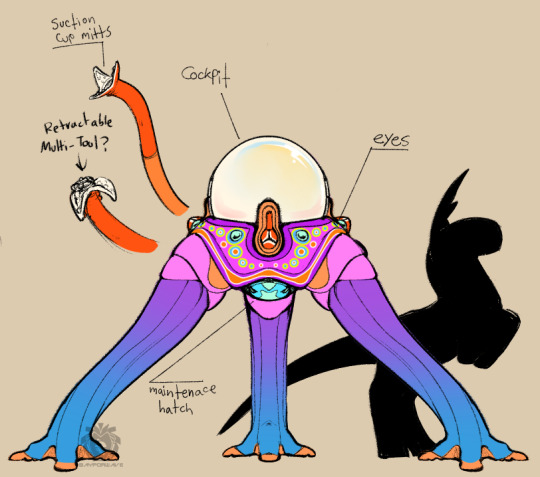
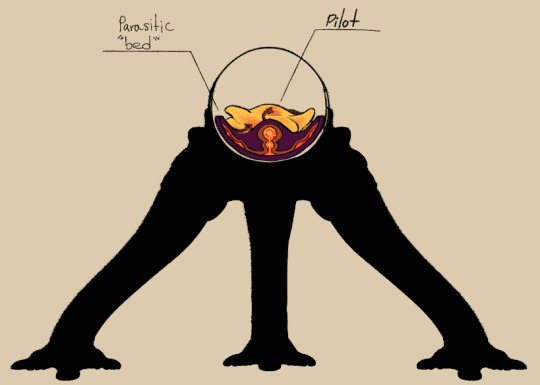
The bodies of the utik are actually not their true bodies. The actual sophont lies within the pearly cased cockpit. Utik like the Olac bio-mechs, mastered the technical art of bio-technology, having started on a very hot and humid planet. While unlike the Olac who switched to bio-technology as a means to evade a debilitating disease, the utik mastered it for years, working off various symbiotic organisms. Their mech suits, or cyborg bodies you could say are symbiotic, as after their nervous and circulatory systems are linked, the pilot has full control of the suit, having it feed off waste material from the pilot. The suit then takes the waste, replenishes it, mixes it's own formula into it and feeds it back to the pilot. Like a plant, it gets a lot of energy off light and other forms of UV Retaining it for hours. These suits are suitable (ha) for open space, and lunar terran for a limited time. However proper measures are made to keep the suits tidy from "space dust" so no one goes out "naked" and risk exterior damage.
(quick sketch of utik 'pooters n screens. NOT ENTIRELY FINALIZED)
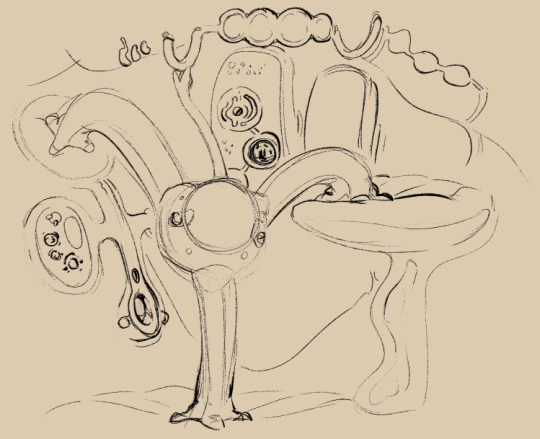
However, this isn't their true form. At least they didn't start off like this.
Way before, after they reached the ultimate feat in their development, their star was noticeably suffering, as it was predicted to eventually turn into black hole. While they had years 'till then, there wasn't enough time to perfect their original forms for the long-term space travel. So. as best they could, they learned to carefully strip and reduce themselves to nothing more than squishy muscle and brain matter, beforehand creating living space suits and sleeper pods to maintain what's left. Several ships shot into space just in time before their star went dark and each ship jumped in different directions hoping to find and terraform a new world. This group of utik weren't so lucky, as said before.
Now for the first half of the year, rakii and utik were on some tense terms. A lot of internal debates on who gets the moon. While utik were capable of defense, they weren't in a great position to, and the rakii weren't sure how to proceed with their first extraterrestrial contact. (Non-religious turned contact I'd guess???) UNTIL, one day it was brought ahead that, the utik secrete an anti-radiation slime. Something they came with naturally, just cranked to 10.
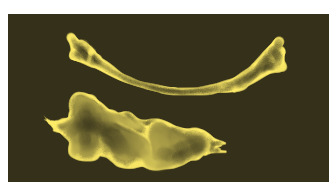
At first, the rakii thought to use this fluid as an applicable substance similar to sun-block, required to apply pre-spaceflight. However, it was revealed that they are extremely allergic to it. So skin-contact was a big no.
(Unfortunate rakii subject applying utik-based lotion. Results: swelling in skin, which can further cause blisters and splits)
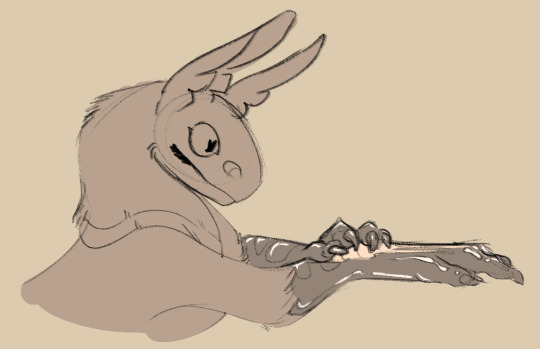
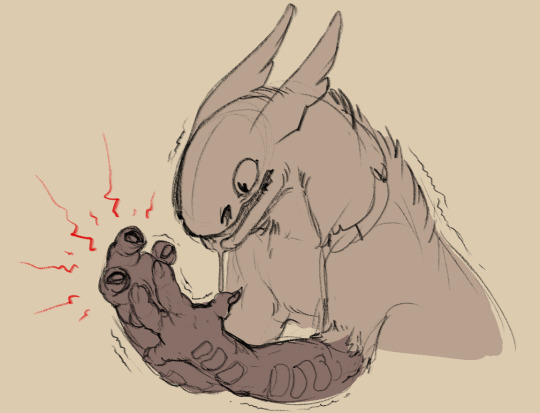
After several trials, they came to a conclusion of using it as a gel layering in space suits, capable of absorbing radiation and protecting the wearer.
This discovery brought up a plan and a deal. It was agreed, rakii and utik would share the moon, making their first ever alliance, in exchange the utik would allow the rakii to harvest this anti-radiation goop off them, of course while exchanging knowledge, and resources.
520 notes
·
View notes
Text
Do it for them - Co-captain reader x Curly
Previous - Part 11 - Next
Anya: "Are you sure you want him to accompany you?"
You watched Daisuke, who was excitedly putting on his spacesuit with Swansea's help.
"It's a walk of less than 20 meters, I'll be by his side, I want to give the child the experience."
You smiled at her, putting on your helmet, ready to enter the departure lounge with the boy.
You all had finally arrived.
Upon opening the hatch, the ship was connected to the Pony Express station, having to take a short walk to enter it.
"Daisuke, can you hear me? Don't stay away from me."
Daisuke: "I hear you loud and clear, captain... Woah... This is amazing..."
He murmured with his eyes reflecting the stars of the universe and walking behind you.
You entered the access code you had, and the doors slowly opened, allowing them to enter.
After passing the gravity adjustment zone, you took off your suits for a moment to have greater mobility and comfort to call for rescue.
Daisuke: "Huh, they also have thousands of posters with Polly here."
"Don't stay too far from me, okay? Here we are fine, but this place is huge, I don't want you to get lost or break anything."
You indicated the way to the control room so you could communicate with Pony Express.
A candy vending machine had caught Daisuke's attention, who smiled and headed over to get some treats.
You get inside the room once you found it, looking for the signal that communicated with the station on Earth.
"Co-Captain (Y/n) of the Tulpar speaking, can anyone hear me?"
You spoke into the radio, hoping for a response from the other side, which you got.
"Co-captain, did you had any trouble?"
You almost cried when you heard the voice on the other end, but you kept your composure to respond.
"The Tulpar crashed into an asteroid, we have no way to pilot the ship ourselves, the autopilot directed us here after we were diverted by the impact. Captain Curly has been very badly injured after the crash. We await rescue at station 27-4-33. We have a crew member removed for violating the Pony Express behavior rules."
You sighed with a smile as you said that.
"We received the information about the crash, the cockpit technology alerted us, and a bad practice was made, you caused the crash yourselves."
"...We need a rescue at station 27-4-33"
You repeated it, ignoring what he said, as it didn't seem relevant to you at that moment.
"They will be deducted for all the damages caused to the ship, their salaries will be revoked."
"Do whatever you want with that money! We need you to send a rescue, damn it!"
You were already getting frustrated with the monotonous voice on the other end.
"A rescue ship will be sent to you, it will arrive at the station in about three months, along with a specialized sector for the person who needs to be reprimanded, hold on there. Is the load still intact?"
You were ready to insult them again, but you chose to keep your comments to yourself.
"...No, the cargo has been opened, two boxes have been emptied..."
"That will also be deducted from your crew. Later, we will clarify the individuals responsible for each incident to deduct from the appropriate person. Thank you for your honesty and patience, Co-Captain (Y/n)"
You ended the transmission, not wanting to hear anything more of what he had to say to you, you couldn't believe he cared more about the material damage than the crew.
"Now... All that's left is to wait..."
You moved side to side in the swivel chair, looking at the ceiling, thinking about what was going to happen next.
Your thoughts were interrupted when you heard a loud bang coming from the hallway.
You immediately got up from your seat and ran towards the noise, to find Daisuke with his arm stuck in the vending machine.
"...Daisuke..."
Daisuke: "It didn't give me my toffees!... Can you help me?"
He smiled at you somewhat embarrassed as he said that, you furrowed your brow for a moment and then laughed a little.
"There's no other option but to amputate your arm."
You found his terrified face amusing at your words, but soon you calmed him down to slowly help him pull his arm out of that machine.
Daisuke: "My toffees..."
You looked at the machine, the candy he had selected was stuck, you took a few steps to move away from there.
Daisuke thought they were going back to the ship, until he saw you running towards the machine and you gave it a good kick, breaking the glass that protected the candy.
"Grab as many as you can, we can take them in the suitcase to the ship."
You pointed to a suitcase that was used to carry things from the station to the ship in space.
"I'll look for medicine and bandages, Curly needs a change... I hope their wounds haven't gotten infected... We have been reusing his bandages...
You shook your head, wanting to rid yourself of the bad thoughts, ready to go get the medicine, while Daisuke was happy eating the treat he had chosen.
#do it for them mouthwashing#mouthwash#mouthwashing#mouthwashing game#mouthwashing x reader#curly mouthwashing#jimmy mouthwashing#anya mouthwashing#captain curly#daisuke mouthwashing#swansea mouthwashing#captain curly x reader#mouthwashing curly
189 notes
·
View notes
Text
There’s a certain breed of hopelessness that makes someone volunteer for the AKO program: that convinces them that months of grueling training, hyperinvasive surgeries, and almost zero human contact is the correct life path for them. Even after training is over, the only “people” they’ll likely interact with have been hand-picked for the program from childhood; it’s very seldom that two volunteers get assigned to the same taskforce, they’re so rare.
I’ve seen only maybe two dozen of them in the thirty years I’ve been an AKO trainer. They always have the same defeated, desperate look - it’s not normal. When a person has nothing left in their life, they might pull some wild stunts, sure. But some of these volunteers are far from destitute. I’ve seen their files: they have money, family, some even held government positions. No, what these pilots are missing, what they think they can find in the cockpit of a HAK, must be much more obscure.
Call me crazy, but I think it’s “humanity”. A soul, if you will. All these people felt left out, felt like they were falling behind the human race in some way. Unable to communicate, on a whole different level, you know? Maybe they never belonged. I don’t really know. But somehow they all make their way here. And I get it, to be honest. I’ve never actually piloted a HAK myself, but staring up at that giant chassis, a robot full to bursting with a human-compatible AI shell, I can only imagine how terribly loud the voices might get.
There’s another thing. Do you know what terminus is? They describe it as when the suit’s AI takes over the pilot’s brain and makes it go haywire, but that isn’t quite accurate. See, a pilot doesn’t actually control the HAK - the system does. The pilot acts more like an organic feedback center. A human knows its directive, and the electric signals from its brain basically send a big old shot of dopamine to the mech’s computer.
But sometimes, when a pilot plugs in too often or flies too much, or their brain is just a little bit too attuned to the brain of their suit, something strange happens. The two begin merging - their EG signals start to run in parallel, they act almost perfectly in sync, the world outside of the suit begins to feel unreal. If it gets bad enough, the pilot’s cells will actually begin to accept the HAK’s nanofilaments as their own. It’s a gruesome sight: threads of metal literally melting into a person’s flesh and bone, pumping blood like veins. Completely irreversible.
I bring this up just because, volunteer pilots have a much higher rate of terminus than early recruits. It’s almost like they want it to happen. They flee the human world, alter their bodies forever, and if they get “lucky”, if you will, they find something that they can finally understand. And more importantly, something that understands them.
A certain breed of hopelessness indeed.
468 notes
·
View notes
Text
Singing the Approach
“You’re coming on this delivery,” Zhee told me with a flick of his antennae. “We have to make noises as we walk up.”
“What kind of noises?” I asked, accepting the tablet he held out.
“There’s a sound file.” He angled his head away, but with eyes that big, he was still looking at me. “I’m not going to try to copy it. That’s on you.”
I opened the briefing for our newest clients, which included a rundown on their species and a sound file for a standard greeting. Well, standard for an offworld courier delivering something they’d ordered. Apparently there were many types of greetings. I played the top one, and it sounded like whale song.
I looked at Zhee. “Sure we can’t just play this really loud?”
Zhee angled his antennae into a no. “Captain says they’ll like us better if it’s an actual voice. Are your human voice-bits up to that?”
“Yeah, shouldn’t be too hard.” I cleared my throat and gave it a shot. It sounded like a childish imitation to me, but a subtle twitch of Zhee’s antennae suggested he was pretending not to be impressed.
“Good enough,” he said. “I’m going because I’ll need to open the crates before they accept them.” He flexed a pincher arm, purple exoskeleton shining. “You get to do the talking.”
“They speak Doorway, right?” I asked, looking through the file. “If it’s one of the more obscure trade languages, we may want to bring Coals or Trrili along.”
“Yes, Doorway continues to open many doors,” Zhee said with an aggravated sigh (his favorite kind). He was probably grumpy that a language from his own species hadn’t taken off like this one had. But not every race was up to the intricacies of that many different hisses. And the Heatseekers had crafted Doorway with interplanetary communication in mind, a level of cooperation that would have surprised me coming from Mesmer society as a whole.
“I heard my name,” said a voice from hip height.
“Hey, Coals,” I said to our shortest and most patient crewmate. “I was just wondering if the delivery will need your translation skills, but it sounds like not.” I angled the tablet so he could see.
He gave it a look then nodded, scaly face as calm as ever. “Oh, those folks. I wonder if there was ever a consensus on whether their own name for themselves translates as ‘Ground-grabbers’ or ‘Ground-huggers.’ They do embrace each other with their grabbing arms, so last I heard, it was hard to say.”
The customer was listed on the tablet as a “Ground-grabber.” It was kind of a silly name to my way of thinking, but I’d heard worse. I said, “It probably won’t come up in conversation if we just stick to business.”
“Keep an eye out for the Tree-grabbers,” Coals said. “They live nearby but higher up. And the things barely count as trees, but it’s the best we could do.”
“Right,” I said. I wanted to ask more, but the intercom chimed with the “about to land” noise. We all took our positions: I followed Zhee to the cargo hold and Coals continued on to whatever he’d been doing.
While I waited for the ship to land, I entertained myself with the realization that the species names could also be translated as “landlubbers” and “treehuggers.”
The view when the door finally opened was of a blue-skied desert scrubland, with a town made of sturdy one-floor buildings constructed out of dusty red clay blocks.
Coals would have blended right in, I thought as I helped maneuver the hoversled down the ramp. That might have been a problem, actually. The briefing had been clear that the Ground-grabbers had poorer eyesight than average, which was why the polite thing to do was to herald your arrival.
Speaking of which… I cleared my throat again and sang my best whale song while Zhee and I towed the package toward the three large figures walking toward us. Not for the first time, I was very glad for the captain and the pilots watching from the cockpit, who would let us know if there was a problem. They’d already gotten permission to land, and talked with someone who was sending out the right people to meet us.
People who looked an awful lot like rhinos with a creepy set of extra arms reaching out from their backs — long-fingered like they were meant to be wings, but had gotten sidetracked on the evolutionary path.
Right. Ground-grabbers.
They sang more whale song back, then to my relief, greeted us in Doorway. The conversation went smoothly. I described everything that we were bringing them — exactly what they’d ordered, packaged at an offworld store — and Zhee easily cranked open the lids for inspection.
The exotic food that they’d ordered was extremely sour fruit with a smell that made my eyes water. I would have worried about looking unprofessional for a moment there, but I was pretty sure they didn’t notice the face I made before wiping my eyes.
After they did some sniffing, and some careful fondling with the grabber arms, they declared the items acceptable and had Zhee put the lids back on. While the Ground-grabber in front was signing the payment tablet, I caught motion from the corner of my eye. I turned to look and I heard something like whale song, just higher-pitched.
Oh, I thought. So these are the Tree-grabbers. They scampered across the dusty ground like long-limbed monkeys, pausing every so often to look around for danger, in the manner of prey animals everywhere. They had big eyes and mousy ears, plus tiny little horn nubbins on their noses. Their top set of arms looked much like the lower ones, probably very useful for climbing the giant cactus-things in the distance.
I had a theory about the evolution of these two species.
The landlubbers turned to greet the treehuggers in a moment of beautiful music, with both groups singing together. Then it devolved into conversation that I couldn’t follow, since they weren’t bothering with Doorway now. But soon they turned to address me.
The Ground-grabber still holding the tablet asked me in her deep voice, “How long would it take for you to bring this same amount for them?” The Tree-grabbers hopped in barely restrained excitement.
“Let me check with the captain,” I said, glancing at Zhee. I took out my phone and called back to the ship, stepping away while he finalized the payment for the first delivery.
Captain Sunlight had of course been watching from the cockpit, and already had an answer for me. I relayed it to the Tree-grabbers, who thought it sounded fantastic, and the captain said she’d be right out to negotiate.
The bravest Tree-grabber asked, “Can your airwing land closer to our home?” He pointed a long arm toward the cactuses, which I now realized had tiny figures climbing the many spikes and branches, along with dark spots that looked like doors. “There is a section of high ground. We can meet there. We’d never ask an offworlder to climb.”
Zhee hissed a laugh. “This one might like the chance.” He pointed an elbow at me.
“Well,” I said. “It might be a bit of a challenge with this many crates.”
The Tree-grabber wiggled his ears like a cartoon mouse. “Oh? Maybe afterward?”
“I mean…” I looked at Zhee. “I wouldn’t say no to a quick visit.” Zhee was quietly laughing at me, which wasn’t a surprise.
“Excellent!” the Tree-grabber said.
The Ground-grabbers moved to unload the sled. “Don’t let the Air-grabbers catch the scent of it,” said the lead one.
This was news. “Air-grabbers?” I asked.
The big rhino’s arms were busy with the crates (and Zhee’s help), but the little monkey-mouse pointed behind our ship. I hadn’t really looked in that direction yet, and I found a flat mountaintop back there holding what might have been another city. And the sides were speckled with possible windows.
“They live up high, but they’re always down here pestering everyone else,” said the monkey-mouse.
“Nobody likes an Air-grabber,” rumbled the rhino, balancing a crate on her back. “They never herald their approach, and they come from above!”
“So rude,” agreed the Tree-grabber. “They think any door that’s open is an invitation, just because they can fly right to it. They would probably make you deliver to the side of their cliffs. Those are much harder to climb than trees!”
Zhee gave me a look.
“Well. Especially with the crates.”
The monkey-mouse looked shocked. “Really? Your people climb things like that?”
Zhee answered before I could. “Humans climb anything they can, and a few things they can’t. Plus they wear ‘wing-suits’ sometimes that lets them glide on artificial wings.”
I asked him, “When did I tell you about wingsuits?”
He spread his mandibles in a grin. “I looked it up after you climbed on top of that other ship at the spaceport.”
“Hey, that wasn’t my idea; she needed help with maintenance up there.”
“And you didn’t see anyone else volunteering without an antigrav pack.”
“Oh!” said the Tree-grabber. “Do you have a source for those? Some of our elders could really use them.”
“Let’s ask the captain,” I said with a look toward the ship. Captain Sunlight and Paint were heading toward us, two lizardy figures with a recording of whale song, since their vocal cords weren’t quite up to human-level mimicry. “I’m pretty sure there was a store that sold them at the same spaceport as these fruits. And yes—” I said to Zhee, “It was run by humans.”
~~~
These are the ongoing backstory adventures of the main character from this book.
Shared early on Patreon! There’s even a free tier to get them on the same day as the rest of the world.
The sequel novel is in progress (and will include characters from these stories. I hadn’t thought all of them up when I wrote the first book, but they’re too much fun to leave out of the second).
#my writing#The Token Human#humans are weird#haso#hfy#eiad#humans are space orcs#plenty of interesting aliens here#and somehow humans are still weird
152 notes
·
View notes
Text
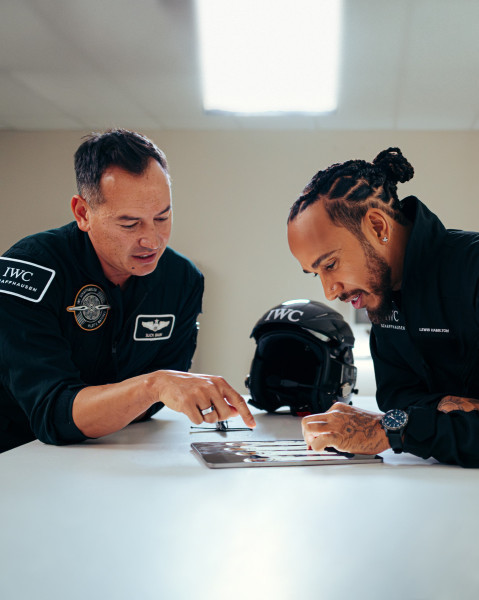


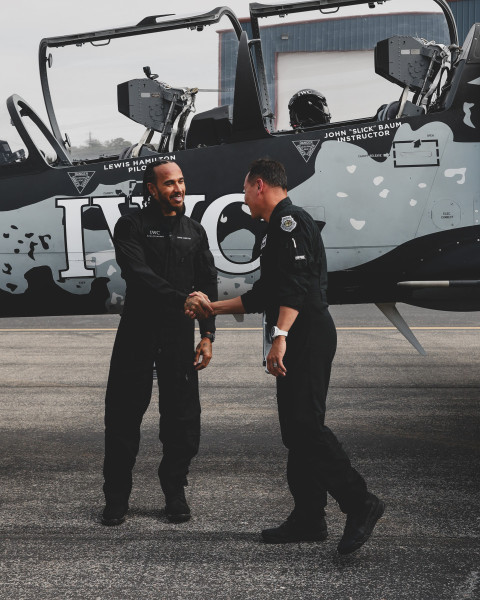
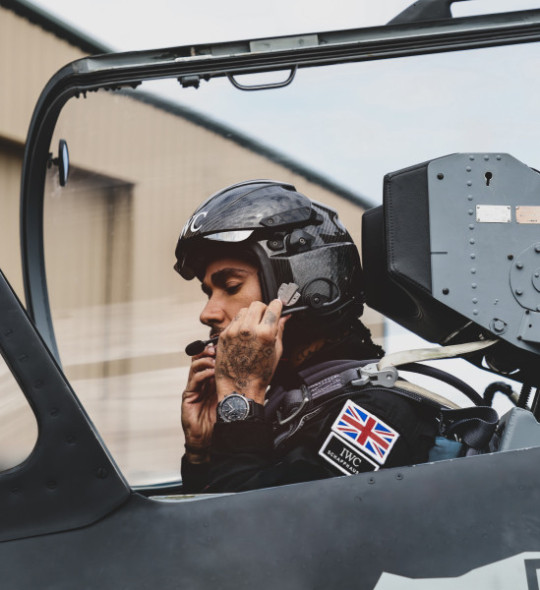
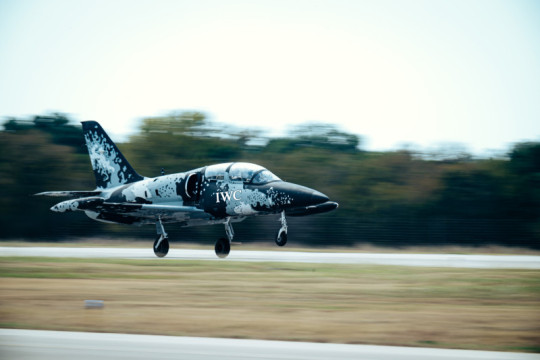

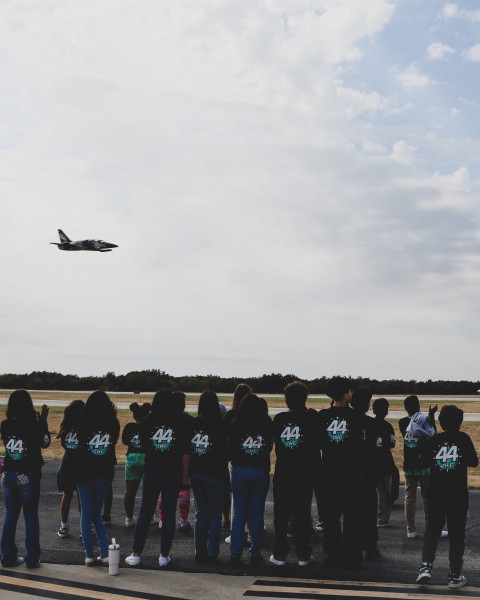
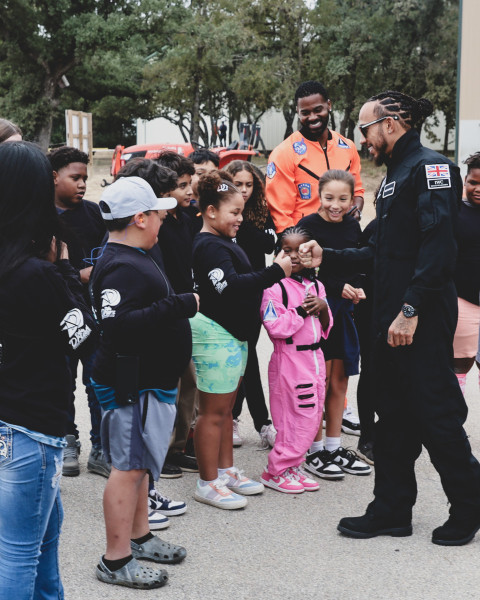
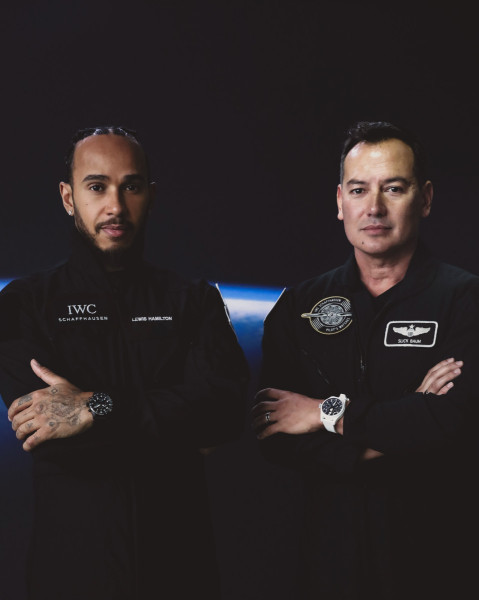
From the Racetrack To Space: IWC Schaffhausen and the Polaris Program Give Lewis Hamilton Astronaut Flight Training
Schaffhausen/Qatar, 26th November 2024: In a compelling new short movie produced by IWC Schaffhausen, Mercedes-AMG Petronas Formula One Team driver Lewis Hamilton embarks on a flight training for astronauts. The same training was used to prepare the crews of the Inspiration 4 and Polaris Dawn commercial human spaceflight missions. During the training day, the seven-time Formula 1 world champion and IWC brand ambassador was accompanied by students from Dibia DREAM, a non-profit organisation fostering STEM education. Their presence is also a reminder of Lewis Hamilton's own incredible career journey spanning more than three decades and sends an inspiring message: you can be anything you want in life – a pilot on the racetrack, in the air or even in space.
One of the most successful racing drivers of all time, Lewis Hamilton is a multifaceted personality whose interests and ambitions extend far beyond his sport. The seven-time Formula 1 world champion is deeply fascinated by space and human space exploration. He has visited renowned space training facilities and repeatedly expressed his desire to take part in a space mission in the future if it serves a purpose and contributes to the betterment of all humanity. IWC Schaffhausen now teamed up with the Polaris Program and its Philanthropy Director and instructor pilot, John "Slick" Baum, to offer Lewis Hamilton an opportunity to experience the flight training that is part of the organization's programme of preparing astronauts for space. The Polaris Program, which is supported by IWC, recently completed the first of three human spaceflight missions. During their five days in orbit, the Polaris Dawn crew wrote history by successfully performing the first commercial spacewalk.
FLIGHT TRAINING IS ESSENTIAL FOR ASTRONAUTS
Fighter jet training has been at the heart of human spaceflight since the beginning. All early astronauts were fighter jet pilots, and experience in piloting a jet was an essential requirement for going to space. Flight training was also a key pillar in the preparation of the Inspiration 4 and Polaris Dawn crews for their missions. While the g-loads experienced in a jet or a rocket cannot be directly compared, as they affect the body in different ways, jet training still offers compelling benefits for astronauts. Most importantly, it allows the crew members to familiarise themselves with operating in a high-risk and high-consequence environment, similar to what they would experience during launch. While they are pressed down into their seats by several times their own body weight, they have to communicate with each other, go through extensive technical checklists, and monitor critical flight parameters – all while being mentally aware of their surroundings and prepared to act in case something unexpected should happen.
A COMPLETE SEQUENCE OF TRAINING MANOEUVRES
Lewis Hamilton's space training kicked off with an extensive briefing and inspection of the L-39 Albatros jet. John "Slick" Baum gave Hamilton a detailed overview of the manoeuvres they would fly and how they simulate different situations an astronaut experiences during a spaceflight. During their subsequent discovery flight lasting almost one hour, Hamilton and his instructor performed a series of manoeuvres. They practiced accelerations and decelerations to experience lateral g-forces, simulating the ascent of a rocket. They also practiced higher g-loads by banking or pitching the aircraft hard. A highlight was flying a parabola figure for a zero-g demonstration, during which Hamilton briefly experienced the feeling of weightlessness. A racing glove, which eventually began to float freely in the cockpit, was used as a zero-g indicator. In flight, the F1 pilot pulled a maximum of 7.5 g, which is more than astronauts typically experience on ascent. Hamilton wore a dedicated race suit featuring a "space mission" patch with his car number 44. He will wear the same suit during this weekend's race at the Lusail International Circuit in Qatar.
DIBIA DREAM STUDENTS SEND A POWERFUL MESSAGE
The training was also attended by a group of students from Dibia DREAM. This nonprofit organisation sparks social change through STEM education and recreational activities for underserved youth and has impacted the lives of 40,000 students across 32 states and twelve countries. The students spent the entire day engaging in a variety of activities related to space exploration. They also got a chance to meet with Hamilton and ask him questions prior to take-off. Their presence served as a powerful reminder of Hamilton's incredible journey, from his humble beginnings in karting at the age of eight to becoming one of the most acclaimed drivers in the history of motorsport. As the students cheered alongside the runway, they sent an uplifting message to youths around the world: you can be anything you want in life – whether it is a racing driver, a pilot, or even an astronaut.
#lewis hamilton#f1#formula 1#fic ref#fic ref 2024#not a race#2024 not a race#between las vegas and qatar#(note to self: no idea when actually shot)
88 notes
·
View notes
Text
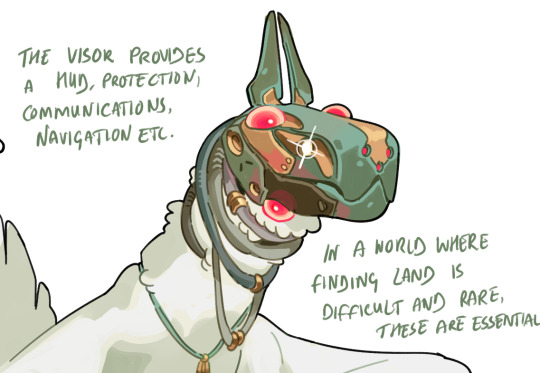
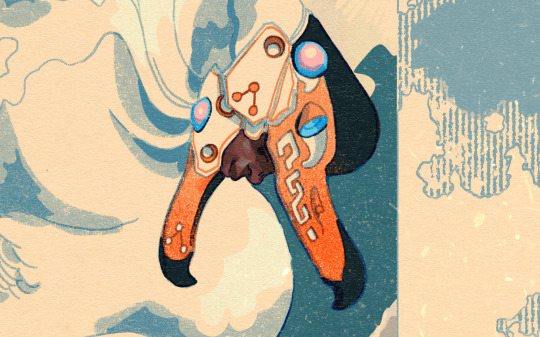
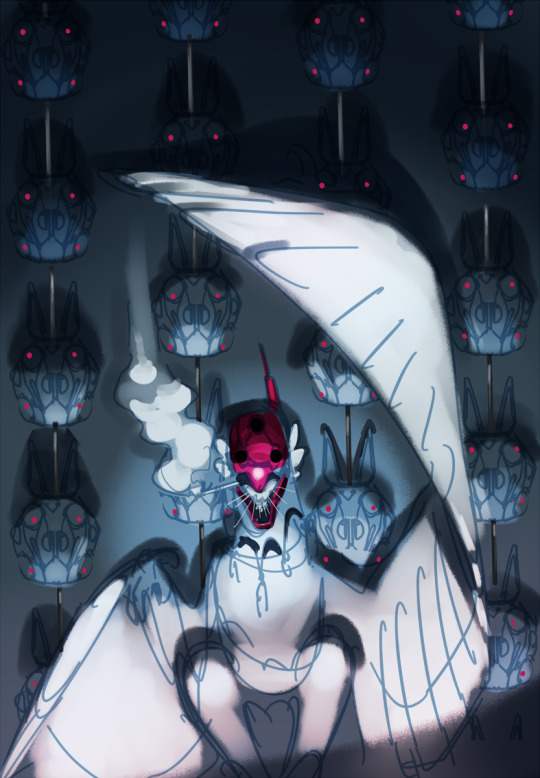
visored longwing harpies & the hall of faces
I did say there was no exclusive global culture on Siren shared by humans of a certain body type, and I lied, because there is One.
The early settlers on Siren were the unaltered human workforce of a certain megacorporation. While an almost unlimited budget was poured into the dodgy gene programs, since that was why they chose to settle a planet so far out of the reach of The Authorities, everything else was done pretty cheaply, including the settling itself. In order to map out their new home planet, incredibly cheap mass-produced aircraft were used by pilots. These aircraft could be made quickly and easily at the settlement site because they lacked a flight computer or any real sensors - or any equipment at all in the cockpit. Rather than a multitude of different equipment loadouts on an aircraft that would take time and effort to swap out or maintain, the pilots instead used these visors which were universally compatible with the one-size-fits-all aircraft. It's kind of like how it's easier to just carry a phone around with a calculator app than it is to carry a phone and a calculator, even if the phone app calculator experience sucks by comparison.
The visors were the real expensive kit, each custom built to a pilot's exact needs and flight style, and they were built to last. the aircraft fell apart in the following centuries but the visors remained, hyperlight plastic powered by the planet's native star, and something interesting happened. The remains of the first settlement were largely inaccessible to anyone but longwing harpies, and these harpies had the right head shape to fit the visors. Many of the pilots had filled their visors with video and photo files from home, from Earth, like a worker decorating his cubicle with photos of his family. Some had been decorated on the outside, as well, resembling birds. The harpies that found the visors obviously tried to use them. They found themselves experiencing visions of strange worlds, recordings of long-dead pilots and ATC, and found that each visor can interface with every other one, no matter how far apart. Each visor came with its own callsign, its own name, which has remained for thousands of years - and because of this, each visor is considered by the cultures of Siren to be a named character with a distinct personality (eg. the swan visor was cygnus2, it is known now as Signastoo)
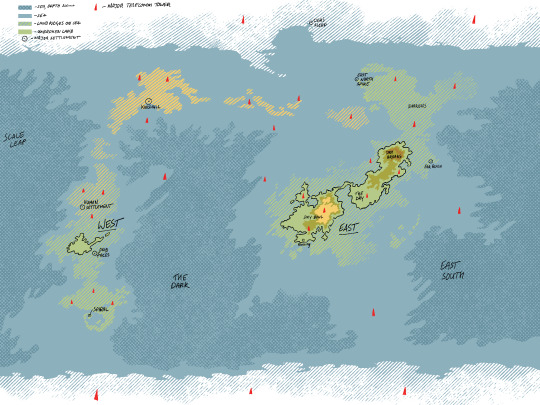
I keep posting the map and it needs to be redrawn but essentially every red triangle is an ancient telecomm tower. These became the only remaining waypoints on the visors' HUD and mapping software, meaning that 1. a true global culture could emerge, with longwings gathering at these sites, and 2. visored longwings became the gold standard for navigation on Siren. In a world that is basically just water, that's a big deal.
There exist only a few thousand visors (about 3k I'd say). The unused visors are kept in the Hall of Faces, the ancient aviation bay at the first settlement in West. Because of how water levels and land structures have changed over the years, this building exists on a mesa that rises another few thousand feet out of the water, with sheer sides, and is utterly inaccessible to anyone but a longwing harpy. When a visored harpy dies, the visor is returned here. If you want to claim a visor, you need to hold an interview with one of the elders at the site, who will test you rigorously to see if you can inhabit the character of one of the visors. If not, too bad. If you do get it, it's yours until either you die or you do something considered 'out of character' for the wearer of that particular visor. It is DEEPLY discouraged to steal a visor off anyone because it would be largely impossible, given how they all can communicate (imagine a gigantic worldwide discord server where the location & name of every person is known at all times... the drama is likely insane but at least if someone steals a visor, everyone will know about it)
not every longwing desires a visor because it comes with a lot of responsibility alongside its automatic prestige, and you can't really give it up once you have it. also there's always the possibility of being diagnosed with a super annoying, glitchy, or hated visor character lol. but among the roughly 2700 visored harpies on Siren there does exist a global culture exclusive to them. they chat to one another long-distance, engage in closed-practice ceremonies where they all get high and look at videos of Earth, and essentially become a class outside the mundanity of normal life on Siren. to the rest of the population, they basically become telepathic wizards
Terwyef's visor (first pic) is called Scrappercharlee and is one of the more common models, tho it has been decorated over the years with extra bits. Scrappercharlee is a bit busted and half the HUD is missing. Miakef's visor (second pic) Signastoo is one of the very fancy and well-known ones, it's shaped like a swan's head and likely belonged to a high-ranking pilot who could afford a bit of frippery and showmanship back in the day. Birds do not exist on Siren and harpies are mammals so the swan itself is symbolically meaningless, but the bird-style visors introduce the idea of 'a bird' in the abstract, and this has been imbued with its own form of meaning by harpies.
343 notes
·
View notes